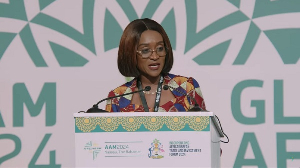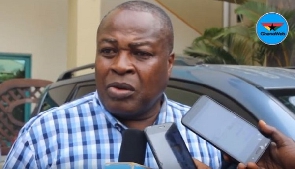Madam Abena Osei-Asare, a Minister of State at the Finance Ministry, says the government will not default on reviews of the US$3 billion loan-support programme with the International Monetary Fund (IMF).
Amid the 2024 elections, concerns have been raised regarding how the government, in the past often skipped reviews during major competitive elections.
However, speaking exclusively with the Ghana News Agency on Thursday, June 20, Abena Osei-Asare said the government would not subject the IMF programme, including the November 2024 review to any election risks.
“Consistently, we’ve kept to the programme because we know how this is important not just to the IMF, but to the people of Ghana, and we’ve said that in this election year, we’ll live within our means,” she said.
“This year, we’ve had two successful reviews, and the next one is in November, and for us, we’ve worked consistently with every review, and that’s what we’ll continue to do,” she added.
The Minister recalled the recent signing of the Memorandum of Understanding (MoU) with the Official Creditor Committee, which she said was a testament of the government’s commitment to the programme.
She indicated that following the signing of the MoU with the Official Creditor Committee, the government had intensified talks with external bondholders, adding that, “we’re waiting for the review to go to the Board”.
The Executive Board meeting has been scheduled for June 28, where Ghana’s second review programme would be considered, and upon approval, there will be the disbursement of a third tranche of US$360 million to the country.
Recalling the country’s history on reviews during major competitive elections, Godfred Alufar Bokpin, a professor of finance with the University of Ghana, said it was important for the government to be guided by previous experiences.
He said: “Our own history tells us that in almost all the presidential cycles, anytime we’re under an IMF programme, the government doesn’t take the review that happens at the peak of the elections seriously, sometimes, they will find reasons to postpone it to after the elections.”
“So, we’re hoping that the government will be mindful of the agreement and work towards the structural benchmarks with respect to the fiscal council and rules, and make them biting enough,” he added.
The Economist noted that in the past, the government tended to over spend during election years amid and IMF programme, and found ways to reschedule the review to avoid the Fund to report it.
That, he said, was done because negative news would impact their political fortunes, and called for a collective action among the media, academia and Civil Society Organisations (CSOs), to ensure that the government did not skip the next review.
“The next review is what we must all focus on; we must all put our voices to the table and ensure that we do not skip that important review,” the professor of finance said.
Click to view details



General News of Friday, 21 June 2024
Source: GNA

















